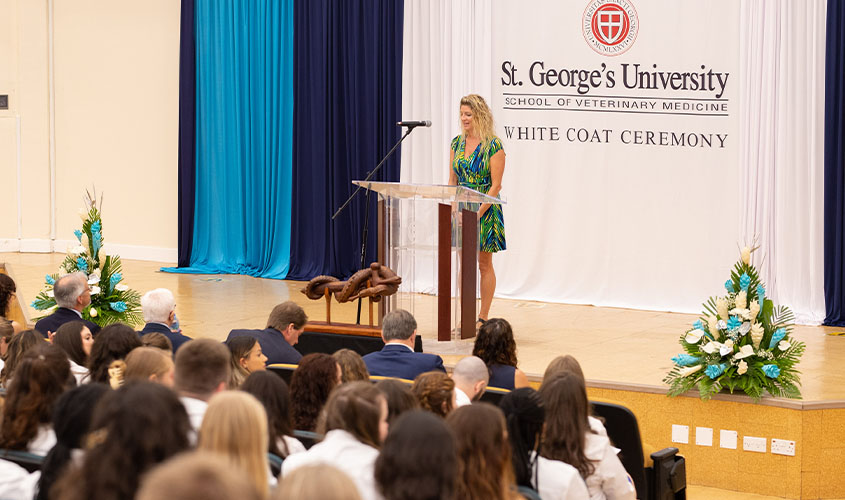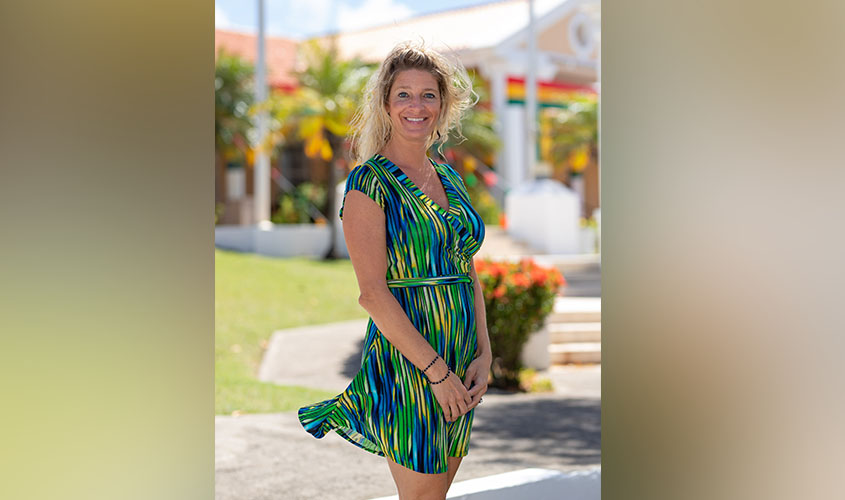What’s it like to be a Master of Ceremonies? Just ask Christianne Shaw, DVM ’12, who accepted the role with pride for the January 2024 School of Veterinary Medicine White Coat Ceremony at St. George’s University.
“January 2008—16 years ago, I was wearing this white coat, sitting right where all of you are, thinking, what did I get myself into,” Dr. Shaw said during her opening comments. “I was nervous and scared, but also so proud. I had finally done it. I got into vet school and here we go. Throughout my three years in Grenada, it was really tough and challenging but also so rewarding. … It was an amazing experience while being at SGU.”
Students in the SVM’s Class of 2028 took to the stage at Patrick F. Adams Hall on January 27 to receive their white coats—signaling the start of their professional journey.
Read more about the School of Veterinary Medicine’s recent White Coat Ceremony
After attending SGU, Dr. Shaw returned to her home state of Ohio, completing her clinical year at The Ohio State University. She worked as an associate veterinarian, practicing in various small animal clinics. Since graduating from SGU, Dr. Shaw has been a regular visitor to Grenada and recently came back full time, accepting a position as assistant professor in the Small Animal Clinic.
“Being on this beautiful island and St. George’s University meant so much to me as a student that I wanted to be able to come back as an experienced veterinarian and give back to all of the future veterinarians,” she said.
SGU News caught up with Dr. Shaw to learn more about her SGU experience, what she is most excited for as a full-time resident in Grenada, and her advice for veterinary students.
SGU: How did you react when you were asked to be Master of Ceremonies for the White Coat Ceremony?
Dr. Shaw: School of Veterinary Medicine Dean, Dr. Neil Olson and I met over Zoom so that he could personally ask me to be the Master of Ceremonies. It was a huge honor to have such an important role in welcoming the new first-term students into the veterinary profession. It was also exactly 16 years since my own White Coat Ceremony at SGU (January 2008), so the experience was very surreal for me.

SGU: What does it mean to you to be back on island teaching the next generation of veterinary students?
Dr. Shaw: My husband (Mike) and I have traveled back to Grenada yearly since I graduated in 2012 and have dreamed of moving here one day. I am grateful for being given this opportunity with SGU to make that dream a reality.
SGU: What learnings do you hope to pass on to students in the Small Animal Clinic?
Dr. Shaw: I am using all of my experience and knowledge (12 years in small animal general practice) to help prepare future veterinarians to smoothly transition into the working world. I am also excited to learn and grow from the current students since I have been out of school for 12 years.
SGU: What most excites you about being back on island?
Dr. Shaw: The beautiful island and warm weather! I was tired of the cold, long winters in Ohio.
SGU: Favorite class as a student?
Dr. Shaw: My favorite classes as a student were the ambulatory/large animal. I especially enjoyed traveling to different farms and helping the animals and farmers throughout the island. I also really enjoyed the large animal rotations in my clinical year at The Ohio State University. Even though I was planning on going into small animal practice, I appreciated just how different large animal medicine can be!
SGU: How did SGU help you achieve your career goals?
Dr. Shaw: At SGU there was—and still is—an endless supply of help and support from faculty and staff members to fellow students. Everyone worked together to be able to accomplish the amazing goal of being veterinarians. The three years I spent in Grenada thoroughly prepared me to go on to my clinical year at OSU.
SGU: What is your favorite animal to work with?
Dr. Shaw: My favorite animals to work with were at the Cleveland Zoo while I was in undergraduate school. This included fruit bats, rhinos, and even a zebra!
SGU: Any pets? Are they with you on island?
Dr. Shaw: I had brought my 19-year-old kitty to the island, but she unfortunately went missing after being here a few weeks. Mike and I do a lot of traveling so it is easier to not have any pets of my own…I get plenty of snuggles at the clinic!
SGU: What should aspiring veterinarians know about SGU?
Dr. Shaw: Although the island is far away from home for most students, it is an absolutely amazing place to be while accomplishing the dream of becoming a veterinarian.
– Laurie Chartorynsky
